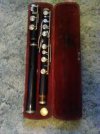| Advertisement |  |
Click to advertise with us! |
You are using an out of date browser. It may not display this or other websites correctly.
You should upgrade or use an alternative browser.
You should upgrade or use an alternative browser.
Flute D'Amour
- Thread starter Sopranino
- Start date
Based on the amount of videos I saw and the fact that there are a couple places that still make them, I'm not going to call them "rare" 
If nobody else answers this thread, I'd recommend that you start with https://napbirt.org.
If nobody else answers this thread, I'd recommend that you start with https://napbirt.org.
I have observed that B flat flutes and A flutes that are not Boehm key systems are also being called Flute D'Amour. These are not always older. Irish and other folk music still use B flat and A flutes with old traditional key systems. The reason behind these non Boehm system flutes still being used is the combinations of other instruments you are playing with and their inherent pitch and key. Very much like the D flat flutes and piccolos, the key of the music in which you play will sound very different on these instruments. Example: piccolo part in Stars and Stripes Forever - G major vs. A flat.
Enjoy the exploration of flutes in different keys. Having played E flat, D, D flat, C, and G flutes each having a unique beauty and place in performance, although not all are practical.
Currently, I'm dabbling with a pre-Boehm keyed German D flat flute (pictured below). Transposing to concert pitch greatly alters the color. Playing concert pitch flat keys make beautiful transpositions with rich color.
Enjoy the exploration of flutes in different keys. Having played E flat, D, D flat, C, and G flutes each having a unique beauty and place in performance, although not all are practical.
Currently, I'm dabbling with a pre-Boehm keyed German D flat flute (pictured below). Transposing to concert pitch greatly alters the color. Playing concert pitch flat keys make beautiful transpositions with rich color.
Attachments
The pitch is A=440hz.Faganflute, is your Db flute concert pitch A=440hz or does it use one of the more esoteric intonation standards?

